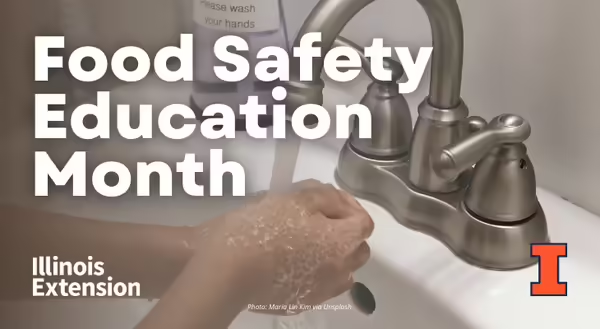
September is Food Safety Education Month. The Centers for Disease Control and Prevention (CDC) estimates that 1 in 6 Americans get sick with foodborne illness each year. Lucky for us, food poisoning is preventable; but we all must work together to protect ourselves and each other. What’s your food safety questions? Here are a few that I’ve received since working at University of Illinois Extension:
- I accidentally left our leftover lasagna out on the counter overnight. Is it still safe to eat? No. Bacteria that causes foodborne illness can grow quickly at room temperature. Therefore, perishable foods must be refrigerated within two hours (or one hour if outside where temperatures are 90°F or warmer). Even if you reheat leftovers to the proper temperature of 165°F, some pathogens produce spores, which are resistant to heat. Before refrigerating, cool food promptly by surrounding the dish with ice water, adding ice as an ingredient where sensible, dividing the food into smaller containers no more than 1-2 inches deep, or breaking down large cuts of meat.
- My power went out. What do I need to toss from my fridge and freezer? It depends on how long the power was out and what the temperature of the food is. Most freezers filled full will keep foods safe for 2 days and half-full freezers for one day, as long as the doors aren’t being opened. Food in the refrigerator will keep food safe for no more than a few hours. Check the temperature of the food; if food has been above 40°F for two hours or more, you will need to discard all perishable items, keeping only butter/margarine, hard or processed cheese, juice, canned or fresh fruit, breads, peanut butter and condiments.
- I hard boiled some eggs but noticed one of the eggs floated while the others sunk. Does this mean it’s not safe? Not necessarily. It just means it’s old, but it doesn’t mean it’s not safe. The United States Department of Agriculture (USDA) recommends using raw shell eggs within 3-5 weeks since purchasing them, not by the sell-by date on the carton. If an egg smells bad after cracking it open, discard it and don’t use it.
Do you have a food safety question? Contact Jenna Smith, Extension nutrition and wellness educator, by email at jesmith6@illinois.edu or by phone at (309) 663-8306.
Sources:
Centers for Disease Control and Prevention. Food Safety Education Month: www.cdc.gov
U.S. Department of Agriculture. AskUSDA: www.usda.gov
Donna Falconnier, University of Illinois Extension, Safe Food Handling During Power Outages, www.extension.illinois.edu